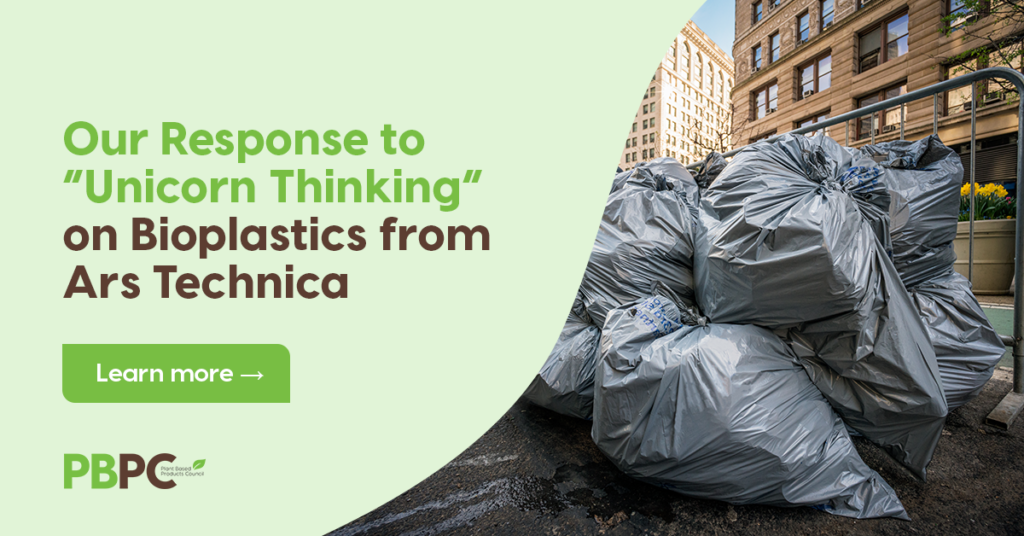2/27
More Unicorn-Thinking in Ars Technica’s Piece on Bioplastics
“Even if bioplastics are often less damaging than the status quo, they aren’t a flawless solution.”
This sentence appears in a recent Ars Technica article, illustrating the peculiar way the media and many commentators think and talk about the issue of whether bioplastics are better for the environment than legacy plastics.
Why is the fact that bioplastics are not “flawless” so often treated as a starting point for discussion? Why, to use the cliché, is the sustainability commentariat so comfortable treating the perfect as the enemy of the good?
Just as we can imagine the ideal version of countless different concepts—the perfect car or the perfect meal, say— so too can we create a list of necessary and sufficient conditions for the perfect packaging material. But rarely, if ever, are idealized versions of any product attainable in reality. That’s why it has become common parlance to refer to these sought-after, but rarely found ideals as “unicorns.”
Like the imaginary, magical horned horse, the “flawless solution” to single use exists only in our imaginations. Yet, when bioplastics are discussed as a possible step forward toward that ideal, their benefits are rarely compared to the status quo – instead, they are compared to the unicorn scenario, and, unsurprisingly, fall short.

At the Plant Based Products Council, we believe our focus should be on the solutions that are possible today as a step toward an even better tomorrow. When you compare bioplastics and plant-based packaging alternatives to our current reliance on conventional plastics, it’s easy to see the massive benefits these products have the potential to offer. And we can get there through a combination of innovation and realistic policy changes to our waste management infrastructure.
But the Ars Technica piece falls into the same common argumentative traps in discussing the efficacy of bio-based materials: widespread adoption of bio-based products won’t be inexpensive or easy; consumers may be confused and think that these products break down in nature; there aren’t unified standards for labeling bio-based materials; and we just don’t have the infrastructure yet to be able to properly dispose of these products.
We see these concerns raised time and again and have addressed them repeatedly. And we agree that in order to reap the rewards of bio-based materials, we have to grapple with these issues. But they’re not a cause for despair. They’re a call to action. News outlets like Ars Technica, groups like ours, and public officials should all be working to educate consumers on the proper way to dispose of these products and push for clearer labeling so that we can maximize their environmental benefits.
Instead of unicorn-thinking, let’s think about the steps we can take toward to a circular economy. In this scenario, plant-based plastics, which remove carbon from the atmosphere, have replaced many of the conventional plastics we use today. Labels clearly communicate to consumers the end-of-life disposal process for the products they use. In fact, the plant based products industry is already working hard to make this a reality.
Let’s also imagine what will happen when federal, state, and local governments commit to investments in infrastructure so that bio-based materials can be properly sorted and disposed of. For example, improved composting infrastructure would allow for the diversion of compostable bioplastics and waste (including any compostable organic matter) from landfills to facilities that will use those materials to create compost. The compost produced at these facilities can then be sold to farmers and other landowners who will use it on their land to improve soil health, water quality, and carbon storage in the soil while contributing to a reduction in overall landfill methane emissions.
These new facilities will create and sustain jobs for years to come, according to both the EPA and the Institute for Local Self-Reliance. And perhaps more importantly, products that have been properly sorted at these facilities will ensure that our oceans, waterways, and forests have fewer legacy plastics persisting in the environment for decades, harming precious ecosystems.
Credit where it’s due, the Ars Technica article does point out that bioplastics are a step in the right direction. And one day our innovative industry may yet create the products with all the unicorn qualities dreamt up by commentators on this issue. In the meantime, let’s look to bio-based plastics and packaging as a more sustainable alternative to traditional plastics.
